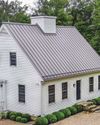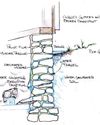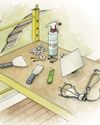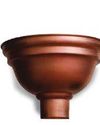
To make the most efficient use of your fireplace (and to prevent potential catastrophe), regular chimney cleanings are a must. Even if the fireplace is used infrequently, have a professional sweep clean it once a year. Fireplaces used more often may need more frequent cleanings. Anyone who burns wood in a fireplace insert or stove knows that the appliance operates better if the chimney is cleaned at least once per winter as well as annually in the off-season.
A safe chimney begins in the firebox, which should be lined with fire brick. The flue should be lined and insulated, either with a traditional masonry liner or a metal or cast-in-place liner. A damper that shuts off the flue when the chimney isn’t in use is essential, too. Last but not least, every chimney should have a cap. Caps made of aluminum, steel, or copper keep precipitation from falling directly into the flue and prevent birds and other wildlife from building nests inside the chimney.
Fire Brick
This story is from the {{IssueName}} edition of {{MagazineName}}.
Start your 7-day Magzter GOLD free trial to access thousands of curated premium stories, and 9,000+ magazines and newspapers.
Already a subscriber ? Sign In
This story is from the {{IssueName}} edition of {{MagazineName}}.
Start your 7-day Magzter GOLD free trial to access thousands of curated premium stories, and 9,000+ magazines and newspapers.
Already a subscriber? Sign In

Navigating the Lumberyard - Here's some lumber lingo you should know before you venture into a lumberyard.
Here's some lumber lingo you should know before you venture into a lumberyard. Almost everyone fixing an old house will end up at a lumberyard-whether it's a local supplier or the organized aisles of a big-box home-improvement store.

a farmhouse renewed
Sensitive renovations and restoration work preserved a house that dates to 1799.

AN OVERVIEW OF METAL ROOFING
METAL ROOFS ARE RESURGENT, FOR GOOD REASONS.

ENDURING BEAUTY IN WALLS of STONE
Now back in the family who had been here since 1830, the old farmhouse is again ready for generations to come. Additions dating to 1840 and the 1950s were preserved.

ARCHITECTURAL DETAILS COME TO LIFE
Owners and their designer celebrate the unique features of a 1912 Arts & Crafts Tudor.

For a Wet Basement Wall
If there's problem common to old houses, it's a wet basement. I'm not talking about occasional flooding, but rather a basement that apparently seeps or leaks after even a rain shower or during snowmelt. Several approaches are available; sustainable solutions will get to the root of the problem.

Patching a Plaster Wall
Fix a hole in the wall with a few common tools and some drywall supplies. Practice your technique!

Roofing & Siding
Make note of these historical and unusual materials for the building envelope.

The Riddle of the water
When water incursion happens, the roof isn't necessarily the culprit. Maybe snaking a drain line, or clearing debris from a clogged gutter, temporarily will stem a leak. But a recurring problem usually means other forces are at work. It takes persistence-and a team with the right skills and patience—to identify the source and apply a solution.

Light-filled Craftsman Redo
For a dark kitchen in a 1914 Illinois house, the trick was anchoring white expanses with woodsy warmth.